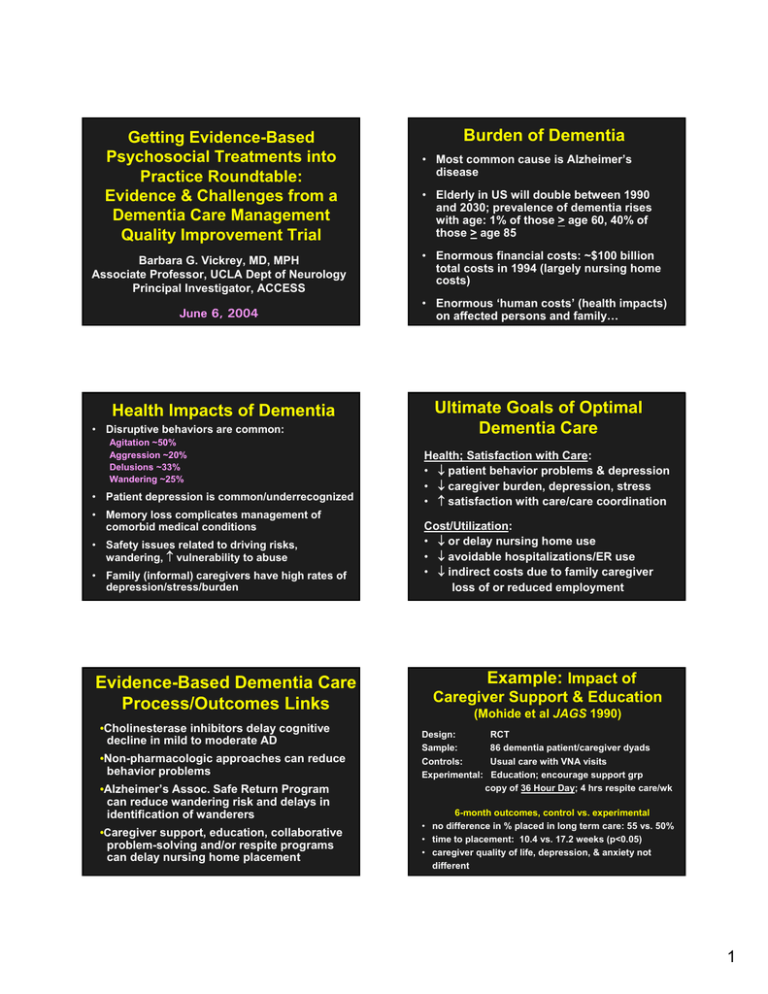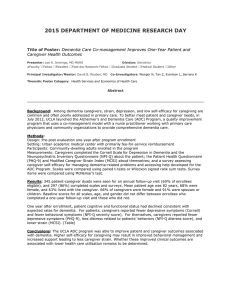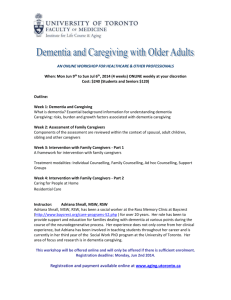Burden of Dementia
advertisement

Getting Evidence-Based Psychosocial Treatments into Practice Roundtable: Evidence & Challenges from a Dementia Care Management Quality Improvement Trial Barbara G. Vickrey, MD, MPH Associate Professor, UCLA Dept of Neurology Principal Investigator, ACCESS June 6, 2004 Health Impacts of Dementia • Disruptive behaviors are common: Agitation ~50% Aggression ~20% Delusions ~33% Wandering ~25% • Patient depression is common/underrecognized • Memory loss complicates management of comorbid medical conditions • Safety issues related to driving risks, wandering, ↑ vulnerability to abuse • Family (informal) caregivers have high rates of depression/stress/burden Evidence-Based Dementia Care Process/Outcomes Links •Cholinesterase inhibitors delay cognitive decline in mild to moderate AD •Non-pharmacologic approaches can reduce behavior problems •Alzheimer’s Assoc. Safe Return Program can reduce wandering risk and delays in identification of wanderers •Caregiver support, education, collaborative problem-solving and/or respite programs can delay nursing home placement Burden of Dementia • Most common cause is Alzheimer’s disease • Elderly in US will double between 1990 and 2030; prevalence of dementia rises with age: 1% of those > age 60, 40% of those > age 85 • Enormous financial costs: ~$100 billion total costs in 1994 (largely nursing home costs) • Enormous ‘human costs’ (health impacts) on affected persons and family… Ultimate Goals of Optimal Dementia Care Health; Satisfaction with Care: • ↓ patient behavior problems & depression • ↓ caregiver burden, depression, stress • ↑ satisfaction with care/care coordination Cost/Utilization: • ↓ or delay nursing home use • ↓ avoidable hospitalizations/ER use • ↓ indirect costs due to family caregiver loss of or reduced employment Example: Impact of Caregiver Support & Education (Mohide et al JAGS 1990) Design: Sample: Controls: Experimental: RCT 86 dementia patient/caregiver dyads Usual care with VNA visits Education; encourage support grp copy of 36 Hour Day; 4 hrs respite care/wk 6-month outcomes, control vs. experimental • no difference in % placed in long term care: 55 vs. 50% • time to placement: 10.4 vs. 17.2 weeks (p<0.05) • caregiver quality of life, depression, & anxiety not different 1 Traditional Sources of Selected Evidence-Based Care Processes Process Cholinesterase inhibitors Behavior problems Medical system X x Safe Return Program Caregiver support, Community agencies X X x X education, respite Evidence-Practice Gaps in Dementia Care 100 90 80 70 % ever receiving 60 some or all 50 they needed 40 of service 30 20 10 0 Alz Assoc Caregiver service(s) Ctr service Support group Respite care health plan sample with dementia, mean duration 2.5 yrs Barriers to Adherence to Dementia Care Guidelines iTime constraints of physicians/lack of reimbursement for other level providers iLack of care coordination especially between traditional medical system and community agencies iLack of proactive follow-up to reduce risk of escalation of problems iPatients (caregivers) inadequately educated/activated to manage their illness ACCESS Study Goals Design evidence-based care management intervention for improving dementia care quality Implement the intervention in diverse health care organizations, partnering with key community agencies that focus on dementia/caregivers Test the intervention’s impacts on quality of dementia care, as measured by adherence to a set of dementia care guidelines Project Partners: Kaiser Permanente San Diego Scripps Clinic University of California San Diego Healthcare Meals-on-Wheels Greater San Diego Alzheimer’s Association San Diego Chapter Southern Caregiver Resource Center University of California, Los Angeles Funding Agencies: California HealthCare Foundation, California Department of Aging, California Department of Health Services Existing Dementia Care Structure Patient Caregiver(s) Health Care Systems •Primary Care Physicians • Other Care Providers Community Agencies •Usual Care Providers 2 Structure and Relationships in ACCESS QI Model Patient Caregiver(s) Health Care Orgs • Dementia Care Managers • Primary Care Physicians • Other Care Providers Community Agencies • Dementia Care Managers • Usual Care Providers IT (CaseTrakker) ACCESS Intervention (cont’d) ¾ Identification of local champions ¾ Collaborative development of care plan with caregivers/caregiver education/ caregiver activation ¾ Internet-based case management software: • Automated triggers generating problem lists • Templates for care planning/PCP communication • Tracking system to follow multiple cases • Pen - tablets for home assessments ¾ Provider education Key Findings to Date ACCESS intervention group had significantly higher adherence to 24 of 30 dementia care guidelines compared to the usual care group (p<0.05) at 12-18 month follow-up, such as: ¾Appropriate management of behavior problems ¾Receipt of respite services ¾Enrollment in Safe Return Program ¾Development of a care plan ¾Cholinesterase inhibitor use Multi-component ACCESS Intervention ¾ Dementia care managers • at each health care organization and each community agency • home visits: structured assessments triggering care actions • proactive, regular follow - up ¾ Formal procedures for referral to and communication with community agencies and with primary care MDs ACCESS Study Design iPre-post, experimental design with 18month follow-up iGroup-level randomized trial, with clinic as randomization unit iCollaboration of 3 healthcare orgs and 3 community agencies focusing on persons with dementia or their caregivers iMedicare pts >65 yrs, with dementia i408 pairs of patients & caregivers 238 – intervention; 170 - usual care QI Implementation Activities • Regular meetings of Steering Cmte of leadership of the healthcare orgs, community agencies, and a consumer (caregiver), rotated across sites: – Selected which dementia care guidelines to target, through formal consensus methods – Shared information to inventory services and assessment tools and to decide on each org’s roles in the ACCESS model – Subcommittees helped design assessment, care plan, and clinical management procedures – Selected a project logo – Evaluated case management software options – Participated in annual site visits from funder 3 QI Implementation Activities (cont’d) • Letters of support from senior leadership at all organizations • Monthly meetings of dementia case managers from six organizations: – Resolve care coordination issues – Identify and address areas of unmet need, I.e., invited speakers on key topics, shared print or electronic resources, etc. • Advisory Board of consumer reps, researchers, state agency rep Challenges Encountered in Implementation of the Research • Complexity/burden of IRB approvals and recruitment procedures that protect privacy • Proactive/preventive model was a paradigm shift (from reactive/crisis management) for care managers, their supervisors, and caregivers • Creating solutions to coordination issues represented a cultural change for participating organizations (example: Safe Return Program) & required research team support Challenges Encountered in Implementation (cont’d) • While no major health care org changes occurred during the project, some changes in staffing and in health plan inclusion required flexibility to modify recruitment/enrollment protocols • Differences in IT systems across organizations made implementing a common web-based software complex • Human resource policies varied in restrictiveness across orgs, introducing delays in case manager hiring Challenges to Replication • Most expensive ongoing component of program is care managers, but currently no reimbursement mechanisms exist • Full evaluation data not yet available, including impacts on health outcomes and analyses of relative impact of intervention components • ACCESS model is already designed and tested, but multi-component intervention is still complex and requires adaptation, care manager training, and IT support Challenges to Sustainability • Evaluation outcome data - including cost-effectiveness - not available at the time of decisions about sustainability within healthcare organizations (for whom most program costs would be borne) • Insufficient attention during the project by project team/ Steering Cmte to building awareness/ promoting ACCESS at higher levels within healthcare organizations COMMUNITY AND RESEARCH COLLABORATORS • UCLA – – – – – – – Karen Connor, RN, MBA Susan Ettner, PhD Joshua Chodosh, MD, MPH Martin Lee, PhD Marjorie Pearson, PhD Xin-ping Cui, PhD Brian Mittman, PhD • Kaiser Permanente – – – – – Pam Reger Terry Hoppe Lisa Heikoff, MD Sonda Kaldor, MSW Sheila Hale, LCSW • UCSD Healthcare – Ted Ganiats, MD – Carol Taylor, RN, MSN Scripps Clinic Robert DeMonte MD Micheline Rochel, MSW Vickie Dandridge Alzheimer’s Association Tom Pamilla Lucia Eto Southern Caregiver Resource Ctr Lorie Van Tilburg, MSW Edward Delaloza, MSW Meals-on-Wheels San Diego Roger Bailey, PhD Charles Fleischman Consumer Representatives Margo Fox Picou Tom Gillette, PhD 4







